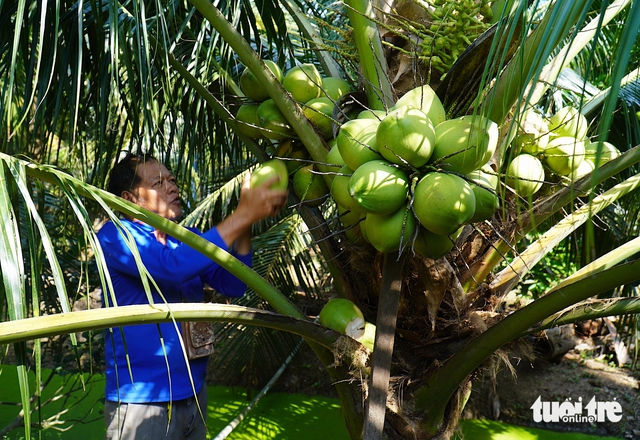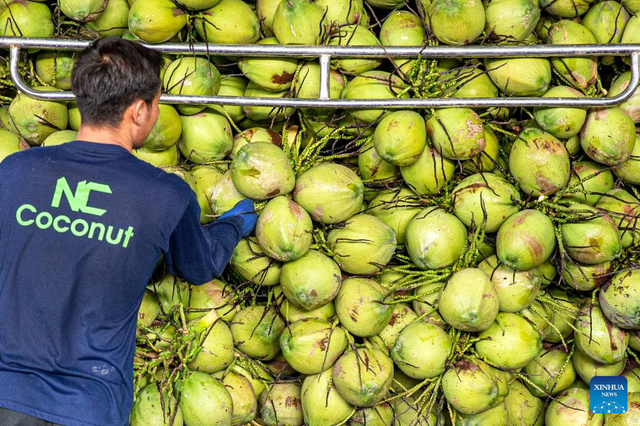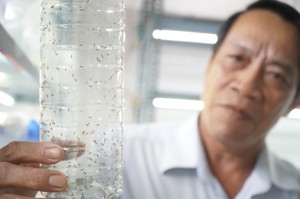
A man harvests coconuts from a tree at a farm in Ben Tre Province, one of Vietnam’s main coconut-producing regions. Photo: Mau Truong / Tuoi Tre
In Thailand’s Songkhla Province, farm-gate prices for aromatic coconuts have fallen to just 2–3 baht per fruit as of Tuesday, compared with production costs of 4–5 baht, The Nation reported. (US$1 = 32.8 baht)
With an annual output of around 500 million coconuts, each one-baht drop in price represents a loss of 500 million baht ($15.2 million), posing a serious threat to an industry valued in the tens of billions of baht.
The price collapse comes as Vietnam’s coconut industry strengthens its foothold in China, previously Thailand’s main export market.
In 2024, Vietnam signed a protocol with Beijing allowing fresh coconut exports, and shipments began later that year.
“The Chinese market, which has very high demand and was previously Thailand’s main buyer, has rapidly shifted its imports toward Vietnam,” The Nation cited agricultural expert Tattawin Saruno as saying.
Vietnam’s coconut cultivation is centered in the Mekong Delta, particularly Vinh Long Province, which produces about two million tonnes annually.
The sector has seen major investment in processing facilities and government support, along with the advantage of geographic proximity to China.
Roughly one-third of Vietnam’s coconut plantations are now organically certified, enhancing the country’s competitiveness.
Export earnings rose from $180 million in 2010 to more than $900 million in 2023 and were projected to exceed $1 billion in 2024.

A worker unloads coconuts in a coconut factory in Damnoen Saduak, Ratchaburi Province, Thailand, November 3, 2023. Photo: Xinhua News
According to the Vietnam News Agency, total coconut exports in 2025 could reach $1.15 billion, keeping Vietnam among the world’s top five exporters.
Cao Ba Dang Khoa, general secretary of the Vietnam Coconut Association, said the country’s four main coconut product groups generated over $520 million in exports in the first half of 2025, a year-on-year increase of more than 20 percent.
Meanwhile, Thailand faces structural obstacles, including inconsistent quality, fragmented smallholder production, and insufficient government coordination, according to The Nation.
The crisis has hit hardest in Ratchaburi and Samut Sakhon Provinces, where many farmers have left coconuts to rot on trees.
Global demand for coconuts continues to grow, driven by their reputation as a ‘superfood’ and by the popularity of coconut-based drinks such as coconut coffee in China.
The market is projected to expand from $3.5 billion in 2023 to $8.2 billion by 2032, The Nation reported.



Max: 1500 characters
There are no comments yet. Be the first to comment.